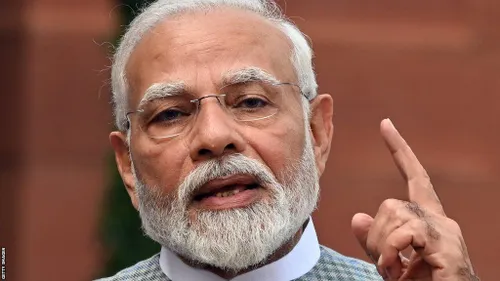Athletes’ Input in India’s 2036 Olympics Preparation
India’s ambition to host the 2036 Olympics reflects a commitment to becoming a global sports powerhouse. Prime Minister Narendra Modi’s call for athletes’ input in the preparation for this monumental event underscores the importance of their experience and insights. This move is crucial for crafting a blueprint that aligns with the needs of sportspeople, ensuring that the event is a success not just for the country but also for the athletes who will compete.
Table of Contents
Understanding Athletes’ Perspective
Athletes possess firsthand experience in international competitions. Their understanding of what it takes to succeed on the global stage is invaluable. They are familiar with the challenges faced in different sports, from the facilities required to the kind of support needed from the administration. By seeking their input, the government ensures that the preparations for the 2036 Olympics will be aligned with the actual needs of those who will be at the forefront of the event.
Infrastructure Development
One of the key areas where athletes’ input is crucial is infrastructure development. Athletes understand the nuances of training facilities, competition venues, and athlete villages. They can provide insights into the kind of surfaces that are preferred, the importance of climate control in indoor venues, and the layout of facilities to ensure maximum efficiency during training and competition.
Sports Science and Medical Support
The role of sports science and medical support in modern athletics cannot be overstated. Athletes are well-versed in the latest advancements in sports science, including nutrition, physiotherapy, and injury prevention. Their input can help in establishing top-notch sports science centers that cater to the needs of Olympic-level athletes.
Training Programs and Coaching
Athletes’ insights are essential in designing effective training programs and selecting the right coaches. They understand the importance of having a well-rounded training regime that balances physical conditioning, skill development, and mental preparation. Their experiences with different coaching styles and techniques can inform the selection of coaches who can bring out the best in the athletes.
Furthermore, athletes can provide input on the kind of support staff that should be included in the team, such as nutritionists, sports psychologists, and strength and conditioning coaches. By incorporating their suggestions, the preparation for the 2036 Olympics will be more comprehensive and tailored to the needs of elite athletes.
Promoting a Sporting Culture
India’s aspiration to host the 2036 Olympics is not just about organizing a successful event; it is also about promoting a lasting sporting culture in the country. Athletes can play a pivotal role in this by sharing their stories and experiences to inspire the next generation of sports enthusiasts. Their involvement in grassroots programs, mentorship initiatives, and public campaigns can help build a strong sports culture that will benefit the country long after the Olympics are over.
Athletes can also advocate for the inclusion of a wider range of sports in school curricula and community programs. By doing so, they can help ensure that sports become an integral part of the lives of young Indians, fostering a culture of fitness, teamwork, and healthy competition.
Ensuring Inclusivity and Accessibility
Inclusivity and accessibility are key considerations in hosting a successful Olympics. Athletes with disabilities can provide critical insights into the design of accessible facilities, ensuring that the event is inclusive for all participants. Their input can help in creating venues that are not just compliant with international standards but also truly welcoming for athletes with different needs.
Athletes can also advocate for the inclusion of sports that are popular in India but may not be widely recognized internationally. This can help showcase the diversity of Indian sports and give athletes from less mainstream sports a platform to shine. By promoting inclusivity and accessibility, India can host an Olympics that reflects the values of fairness and equality.
Enhancing International Collaboration
Hosting the Olympics is not just a national endeavor; it requires extensive international collaboration. Athletes who have competed internationally are well-positioned to provide insights into building relationships with other countries and sports organizations. They can share their experiences with international training camps, exchange programs, and competitions, helping to foster a spirit of cooperation and mutual learning.
Athletes can also serve as ambassadors for the country, promoting India as a welcoming and capable host for the 2036 Olympics. Their involvement in international sports forums and events can help build goodwill and establish India as a trusted partner in the global sports community.
Legacy Planning
Finally, athletes’ input is crucial in legacy planning for the 2036 Olympics. The event should leave behind a legacy that benefits future generations of athletes and the wider community. Athletes can provide insights into how the facilities, infrastructure, and programs established for the Olympics can be repurposed for long-term use.
Their suggestions can help ensure that the investments made for the 2036 Olympics contribute to the development of sports in India for years to come. This includes the establishment of training academies, sports science centers, and community sports programs that continue to nurture talent and promote physical fitness long after the Games are over.
Conclusion
Prime Minister Narendra Modi’s decision to seek athletes’ input in India’s preparation to host the 2036 Olympics is a forward-thinking approach that recognizes the value of their expertise. By involving athletes in the planning and execution of the event, India can ensure that the 2036 Olympics are not only a success but also a turning point for sports in the country. The athletes’ insights will be instrumental in creating an event that is athlete-centered, inclusive, and reflective of India’s commitment to excellence in sports.








